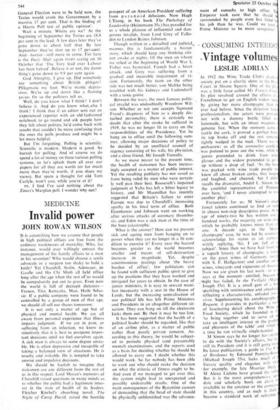MEDICINE
Invalid power
JOHN ROWAN WILSON
It is astonishing how we assume that people in high political offices are free from the ordinary weaknesses of mortality. Who, for instance, would ever willingly entrust the management of his family affairs to a man in his seventies? Who would choose a senile advocate or a surgeon too shaky to hold a knife? Yet Churchill, Stalin, Adenauer, de Gaulle and Ho Chi Minh all held office long after the age when the rest of-us would be compulsorily put out to grass. Even now the world is full of decrepit dictators— Franco, Tito, Kenyatta, Mao, Haile Selas- sie. If a public company were found to be controlled by a group of men of that age, we should all sell our shares tomorrow.
It is not only a matter of age but of physical and mental health. We are all aware from personal experience that illness impairs judgment. If we are in pain, or suffering from an infection, we know in- stinctively that it is best to postpone impor- tant decisions until we feel ourselves again. A sick man is always to some degree unsta- ble. He is often depressive and incapable of taking a balanced view of situations. He is touchy and irritable. He is tempted to take unwise and impulsive decisions.
We should be foolish to imagine that statesmen are any different from the rest of us in this respect. Lord Moran's memoirs of Churchill raised questions in many minds as to whether the public had a legitimate inter- est in the state of health of its leaders. Fletcher Knebel's absorbing novel, The Night of Camp David, raised the horrific prospect of an American President suffering from paranoid delusions. Now Hugh L'Etang, in his book The Pathology of Leadership (Heinemann 35s.) has paraded for us a whole platoon of influential and dan- gerous invalids, from Lord Grey of Fallo- den to Lyndon Baines Johnson.
Though written in a detached and judicial., manner, this is fundamentally a horror story, which should keep any thinking citi- zen awake at nights. Of the men on whom we relied at the beginning of World War I, Fisher was hysterical, French had a heart attack, and Grey was suffering from a gradual and incurable impairment of vi- sion. Fortunately, the team on the other side was not much better, von Moltke being troubled with his kidneys and Ludendorff with a toxic goitre.
Between the wars, the most famous politi- cal invalid was undoubtedly Woodrow Wil- son. Whether or not one accepts Sigmund Freud's diagnosis of him as a deeply dis- turbed personality, there is certainly no doubt that after the stroke he suffered in 1919, he was no longer fit to carry on the responsibilities of the Presidency. Yet he hung on to office until the following sum- mer, allowing major decisions of policy to be decided by an unofficial council of regency consisting of his wife, his physician, and a close friend, Mr Joseph Tumulty.
As we move nearer to the present time, the health of statesmen has been increas- ingly accepted as a matter of public interest. Yet the resulting publicity has not saved us from being ruled by men who were certain- ly well past their best. Roosevelt's impaired judgment at Yalta has left a bitter legacy to history, and Mr Macmillan has recently suggested that Britain's failure to enter Europe was due to Churchill's increasing apathy in his final term of office. Both Eisenhower and Johnson went on working after serious attacks of coronary thrombo- sis, and Eden was a sick man at the time of the Suez catastrophe.
What is the answer? How can we prevent sick and ageing men from hanging on to power when they are no longer in a fit con- dition to exercise it? Every year the hazard becomes greater as the world becomes smaller and means of self-destruction increase in magnitude. Yet, despite sanctimonious pratings about `the heavy burden of office', few politicians can be found with sufficient public spirit to give up the positions that they have worked and intrigued for years to obtain. In the case of junior ministers, it is easy to reward mani- fest incapacity with a seat in the House of Lords, but the increasing centralisation of our political life has left Prime Ministers and Presidents in an altogether different sit- uation. They can hang on till the electorate kicks them out. By then it may be too late.
It has been suggested that the health of a political leader should be regarded, like that of an airline pilot, as a matter of public rather than purely private concern. Ac- cording to this theory, he would be subject- ed to periodic physical (and presumably mental) examinations, and the reports used as a basis for deciding whether he should be allowed to carry on. I doubt whether this would work. So far nobody has been able to work out who should make the decision on what the criteria of fitness ought to be. And even if we managed to get over this, the system might lead to unexpected and possibly undesirable results. One of the main consequences of the Byzantine custom of demanding that the head of state should be physically unblemished was the advance-
ment of eunuchs to high office. Emperor took care that he should surrounded by people even less fitted f his job than he was. Could we trust Prime Minister to be more scrupulouQ


















































 Previous page
Previous page